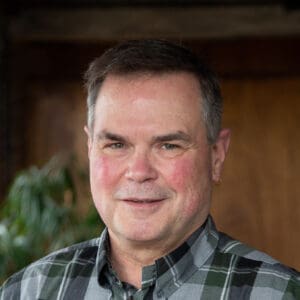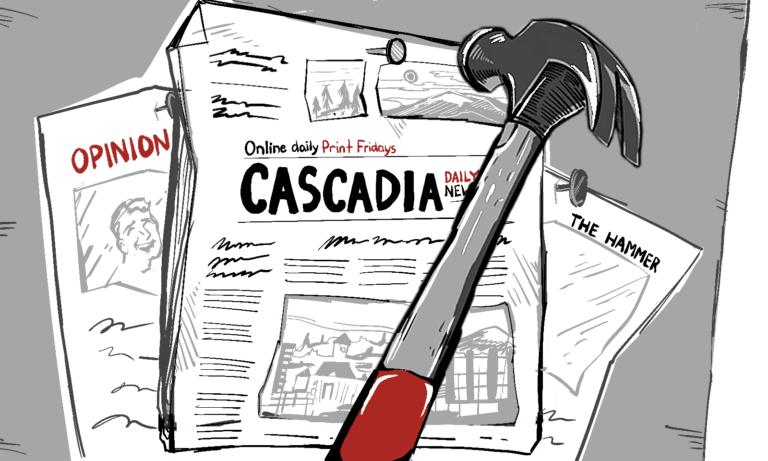Bless the gods, the rains have returned, and so has the loosening of the tie strings atop the Editor’s Mailbag:
Q: I recently read that Bellingham Public Schools has launched a “climate action” program. What “action” does this imply, and will the climate really benefit?
A: I read this also, right on our website. It’s probably a good idea, given the race to the bottom (bottom being a soupy Antarctica, at current rates) we’re currently spiraling downward in.
The “action” announced here includes more energy-smart buildings, reduction of waste and emissions, a curriculum that focuses on sustainability, etc.
All good.
Here’s one wild idea to get them started: How about doing your part to save the planet by turning 90% of that massive, sprawling parking lot at the newish Sehome High School — and one almost as large across town at Squalicum — into P-patch space?
We have mentioned this before, drawing a chorus of zzzzs. But seriously: Is it really necessary for every Bellingham kid to arrive for daily doin’s via gas-guzzling automobile? What sort of example does that set for them — or the rest of us? And how and why, here in Bike Central, where each commuter has their own exclusive lane, are those sprawling parking lots not roller-picketed on a daily basis by vengeful pedalists?
Sehome’s lot, paved with a mixture of tar, gravel and your hard-earned tax dollars, is practically as big as the Great Expanse at Costco. You can see it from the Space Station. A solid “climate action” would be to gate it off and bring on the raised planters. An heirloom tomato on every desk! Let’s make Vitamin A part of the “Bellingham Promise!”
Imagine the national headlines. And the potential cucumber production.
Yeah, we know: Shutting the lot would necessitate grief counselors standing by for teens accustomed to heated-seat arrivals and departures. Plus, alternate transportation would be needed in some cases. And it’s not like the school district already has its own multi-vehicle mass-transit fleet standing by, waiting to shuttle kids right to their doors … oh, wait.
Next question, please.
Q: Has the now-infamous photograph of current mayoral candidate Seth Fleetwood, in which he famously poses in the Bellingham treatment facility, next to flowing human waste, wearing a bright orange vest and shades, been officially retired?
A: Oh god no. It is currently on loan to the Unfortunate Staging Collection at the Smithsonian Institution, after which it will remain on hiatus until after the Nov. 7 general election. Perhaps moments after.
Q: I saw recently that your staff won a slew of awards. Who do you compete against, and who are the judges?
A: Thanks for noticing. The awards were from the Washington Newspaper Publishers Association (WNPA), which represents about 75 smaller newspapers and news organizations across the state. Many of these have smaller newsroom staffs than ours, but we feel like we fit in because of our startup nature and local news/community focus.
Journalism contests are highly subjective; I often counsel staff members to avoid getting too wound up when something great they did finishes third behind something of dubious merit.
But that’s less true for group efforts. For that reason, I was tremendously proud of our General Excellence Award, an overall prize derived from the examination of three complete editions of our print paper. It’s an honor to receive validation for papers produced during our first year of publication, especially given that we are competing against peer news orgs that have been around for more than a century.
Also rewarding was the WNPA Public Service award, granted to CDN for its Citizens Agenda project, through which we “reader-power” election coverage and attempt to inform voters to make smart choices. We’re repeating it this year, culminating in the Voter Guide you see in print editions this week.
Election coverage is intense, trying and complicated. Our staff embraces that challenge because it’s key to our mission and, we believe, helping create the informed citizenry that’s critical for maintaining representative democracy.
The materials we submitted to the contest were judged by peer journalists in Montana. We are extremely grateful for the recognition, and have already begun stubbornly defending that General Excellence award.
Q: The Citizens Agenda sounds good in concept. But do those questions really make a difference to election coverage, or is it just a feel-good exercise for the public to be asked to weigh in?
A: I think they do. Granted, we’re not conducting scientific polls here; our feedback is a small slice of a slightly larger slice. But it’s a smart slice, and the best barometer we have. And I find it to be representative of community concerns we hear through other means.
This year, for example, we knew broad discontent with local health care provider PeaceHealth existed in the community. But I doubt we would have spent as much time grilling candidates about their take on the issue if it hadn’t turned up twice in our list of five most-pressing questions for local pols.
Candidates did, in fact, have to develop and enunciate positions on the matter to reader/voters, or risk appearing out of touch with community needs. The same goes for other 2023 reader-selected issues such as homelessness and addiction, water quality, affordable housing, school board politics and other matters. That changes the electoral playing field — at least for readers of our pages.
When the candidates are not talking directly to us, or responding to our questionnaires, they can talk about anything they want.
Q: When do the clocks change again?
A: Next question. (Spoiler alert: Nov. 5)
Ron Judd’s column appears on Fridays; ronjudd@cascadiadaily.com; @roncjudd.




Legislative preview: To balance budget, it’s time to talk about progressive tax reform